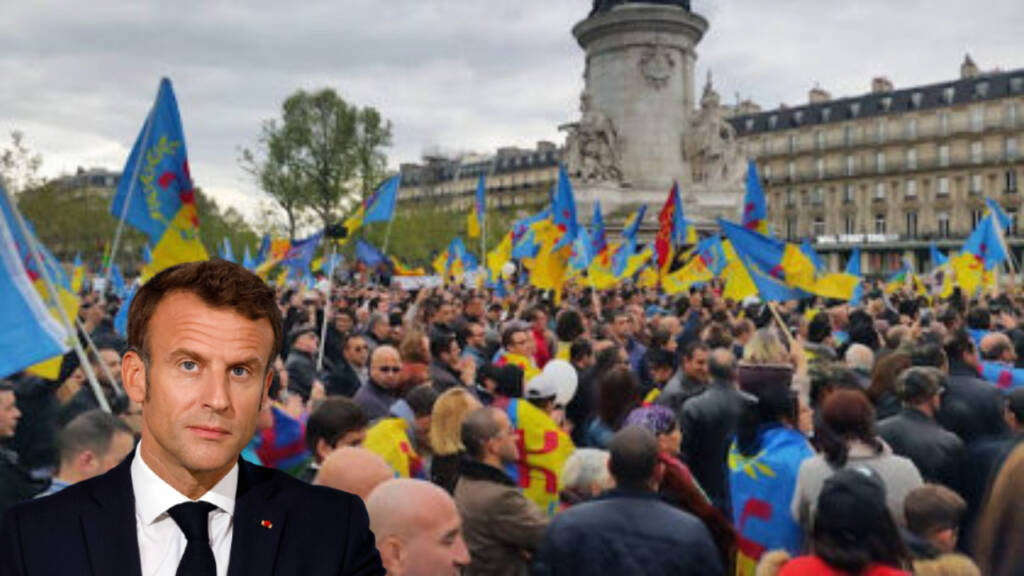Kabyle independence march in Paris: France’s credibility in the African continent is currently at an all-time low, especially after its departure from the Sahel region. The country is struggling to maintain its relevance in the continent.
Similarly, France’s relations with the North African country of Algeria have gone through many ups and downs. In recent times, the situation is only likely to become more complicated. The issue of Kabyle independence is one that looks set to cause more friction between the two countries. How will France handle this, and why does its stance on the issue so far raise doubts about its intentions? Let’s find out.
Kabyle independence march in Paris
According to a recent report, more than 20,000 people marched through the streets of Paris to support Kabyle independence from the military regime in Algiers. They waved Kabyle flags and chanted slogans denouncing Algerian repression in Kabyle. The march was held on the day of Amazigh Spring, which commemorates the Kabyle struggle to emancipate themselves from the grip of the Algerian army. In 2001, the army killed at least 160 Kabylians after they demanded recognition of their cultural and linguistic specificities.
The demonstration was reportedly organized by the Kabyle independence movement, MAK, in Paris, with similar marches taking place in Montreal and San Francisco, where a significant Kabyle diaspora lives. However, the pro-establishment French media ignored the march as President Macron prepared to host the “civilian puppet” of the Algerian army, President Tebboune. Meanwhile, the Algerian security services have banned any march in the Kabyle region and canceled a football match in Tizi Ouzou, the hotbed of Kabyle dissent, to avert a mass protest.
Kabyle issue
The Kabyle independence movement has been championing the aspirations of the Kabyle people since the 1980s. The Kabyles are Algeria’s largest homogenous cultural-linguistic-ethnic Amazigh community, estimated to constitute around 40 percent of the Algerian population, although the exact numbers are disputed.
According to reports, the Kabyles have been vocal about opposing the “Arabization” of their homeland and culture, and they encourage the indigenous Amazigh people of North Africa to do the same. However, the Algerian regimes see this as a challenge to their legitimacy. The movement for the self-determination of Kabyle, known by its French acronym MAK, has organized massive marches in the cities and villages of Kabyle over the last few years, demanding independence from Algeria.
The advocates of Kabyle’s independence cite a series of grievances their region has witnessed since Algeria gained independence. They blame the Algerian regime for seeking to eradicate their linguistic and cultural particularities by imposing an Arabization policy coupled with economic marginalization.
Read More: 5+5 Defense Initiative: France tightens its grip on Maghreb region
Furthermore, Kabyle independence activists argue that their region was attached by colonial France to an artificial Algerian state, and that their historic leaders who fought for independence from France have been marginalized along with their region in post-independent Algeria. On the other hand, the Algerian regime has classified the MAK as a terrorist group and cracked down on sympathizers in the restive Kabyle region, sending scores to jail. The MAK leader, Ferhat Mehenni, along with 49 Kabyle independence leaders, received capital punishment.
France’s relations with Kabyle
There have been incidents in which France’s appeasement policy towards Algeria has put it at odds with Morocco. On the other hand, France’s stance on the Kabyle issue has been nothing less than baffling. The recent protest march in support of Kabyle independence took place in Paris, even as President Macron prepares to host Algerian President Tebboune.
Moreover, in August 2021, the Algerian judiciary issued an international arrest warrant against the movement’s leader, Ferhat Mehenni, accusing him and his movement of setting fires that destroyed large areas of the mountainous region. The investigations confirmed that foreign funding was responsible for the escalations in the region, as per the accusations against Mehenni. In a press conference, Public Prosecutor Sayed Ahmed Murad stated that the MAK had done this with premeditation, not to mention accusations of collaborating with foreign parties. Murad also pointed out that international arrest warrants were issued against 28 people, including Mehenni, who has been in exile in France for several years.
The MAK is one of the most well-known political organizations opposing the Algerian regime since the early 2000s. It is an Amazigh movement that demands self-determination in the Kabyle region. Ferhat Mehenni founded the movement. Since its founding in the early 2000s, the MAK has been active in France, where it found a haven to escape security pursuits. Most of its activists are settled in Paris, where its president, Ferhat Mehenni, also resides, although the movement’s activities are entirely banned in Algeria.
France’s actions have also caused tensions in its relations with Algeria, especially regarding the extradition of Ferhat Mehenni. Despite Algeria issuing an international arrest warrant against him, Paris has been stalling his extradition, which has only increased tensions between the two nations.
Read More: Algeria becomes the battleground between pro-Morocco Arabs and Iran
Now, all of this puts France’s intentions under suspicion. At a time when the former colonial power’s relations with Algeria have become complicated, the Kabyle issue is only going to make it worse. However, France’s actions regarding the Kabyle issue lead to speculations that it is using the issue as a card to keep Algeria subjugated and arm-twist the country to maintain its own geopolitical relevance in the region. How the issue will unfold in the coming days remains to be seen, and it will be intriguing to see if France changes its stance on the issue to appease Algeria.
https://www.youtube.com/watch?v=jzr-BCYUpX4
